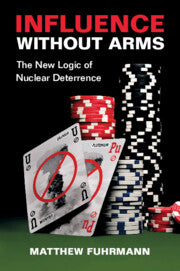Influence without Arms
The New Logic of Nuclear Deterrence
Author(s): Matthew Fuhrmann
Regular price
£26.99 GBP
Regular price
Sale price
£26.99 GBP
Unit price
per
Couldn't load pickup availability
🚚 Please note we can only ship within the UK.
FREE delivery on books (excluding sale).
Delivery for other items is £1.50 - £4.50, calculated at checkout.
T&Cs apply.
Free click & collect on all orders.
- How does nuclear technology influence international relations? While many books focus on countries armed with nuclear weapons, this volume puts the spotlight on those that have the technology to build nuclear bombs but choose not to. These weapons-capable countries, such as Brazil, Germany, and Japan, have what is known as nuclear latency, and they shape world politics in important ways. Offering a definitive account of nuclear latency, Matthew Fuhrmann navigates a critical yet poorly understood issue. He identifies global trends, explains why countries obtain nuclear latency, and analyzes its consequences for international security. Influence Without Arms presents new statistical and case evidence that nuclear latency enhances deterrence and provides greater influence but also triggers conflict and arms races. The book offers a framework to explain when nuclear latency increases security and when it incites instability, and generates far-reaching implications for deterrence, nuclear proliferation, arms races, preventive war, and disarmament.
- Introduces a comprehensive database on the international spread of sensitive dual-use nuclear technology
- Offers a new theory of latent nuclear deterrence and discusses whether a world without nuclear weapons would be safer and more secure.
- Presents new quantitative and qualitative evidence that analyzes how bomb-making capabilities affect a broad range of foreign policy outcomes, including: military conflict, international crises, foreign policy alignment, US troop deployments, preventive military attacks, and arms races
- Offers ten lessons for nuclear politics that identify the many ways nuclear technology shapes international relations and how the international spread of nuclear technology influences international peace and stability, even when countries are technically 'nonnuclear
Share


